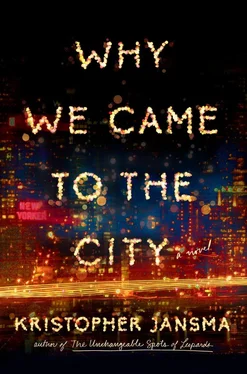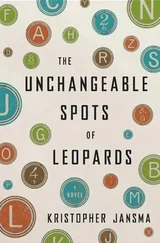Jacob took the first exit and looped around on an overpass, getting back on the parkway heading south again, the way he’d come. He turned the radio off and rolled up the windows. Again, he blew right by Stamford. By the time he got back to Anchorage House and parked in the director’s spot, he’d been gone just over one hour, and there were only two left in his shift. Dr. Givens and Dr. Berg were down by the little trash-filled pond, smoking cigarettes. They definitely noticed Jacob climbing out of Oliver’s truck, but he was finished caring. Life was too fucking short. He wasn’t going to give two fucks about what everyone else thought.
Inside, he walked back into the bathroom stall and sat down on the closed toilet seat. He lifted the truck keys to the cold metal wall and scratched lightly, a little surprised how easy it was to leave a mark. Back in high school he’d done it all the time, leaving cryptic poetry, but he didn’t quite feel up to that yet. He would go to Boston in a few weeks, once Oliver was feeling better. His feet were steady on the tiled ground. His legs didn’t shake on the edge of the seat. His hand scraped at the paint. A little less-than sign and the number three beside it: <3. It made a little heart, just like the ones people had written on Irene’s Facebook wall.
Then he got up and went straight to his assignment in the common area. The patients were playing board games and doing puzzles and watching Judge Judy on the TV.
Paul patted his palm against the wall, as if to coolly invite him over. “Hey la, hey la, your girlfriend’s back. I just saw Jorge from Ward One sneaking a cigarette in the back stairway. Said they readmitted Ella Yorke this morning.”
Jacob wanted to just throttle him. “Fuck. Is she all right?”
“Said she looked kind of sunburned.”
“No, I mean what the hell happened?”
“Guess you’ll have to ask her. Even money she’ll be up here again in thirty days.”
“Shit.”
“Well, you know what they say,” Paul grinned. “Fourth time’s the charm.”
JUNE
The Ward III library was set into an old linen closet off the common area, which had been fitted with shelves and the sort of partly shredded paperbacks found on the racks outside bookshops for a dollar, or for free in a laundry room. A collection of castaways, curated only to the extent that anything vaguely interesting had been chucked. There were a handful of feminine empowerment books for teens and a few pop-psychology favorites: The Road Less Traveled and In Search of Self. The sprawling oeuvre of Dr. Phil. Jacob had noticed that Ella, during her previous stay, had been working through the odd classics, Charles Dickens and Jane Austen, but the library mainly carried the B-side stuff. Pickwick Papers. Northanger Abbey . She had plowed through these in the span of a few days. It had taken Jacob a year in college to trudge through Middlemarch, but Ella had it back on the shelf in under a week. There was really nothing much written after 1890, and when he asked Oliver why they’d omitted anything written after Freud bought his first couch, Oliver had answered that the selection hadn’t been updated since before his arrival, ten years earlier, but that he had once spoken to Dr. Dorothy about it. She was on the committee that oversaw purchasing of books, games, DVDs, etc. Basically everything had to be assuredly harmless. Nothing too scary or too bleak. This explained a lot. After the Industrial Age things got a bit dicey, didn’t they? But most kids wouldn’t slit their wrists after reading Mansfield Park . Jacob argued they might, when faced with the prospect of reading it over and over again all summer.
There was no poetry of any era, which Jacob took as a compliment. Nonstandard line breaks were mighty suspicious. Enjambment, slant rhyme, lack of punctuation? They could easily send anyone over the edge. Keats died young, Shelley drowned. Sylvia Plath, obviously, was strictly verboten. How many girls came in there saying The Bell Jar (practically a suicide manual!) was their favorite book? Jacob had always wanted to give them a copy of “The Colossus” and say “there, there.” And good old Frost had never killed anyone, had he? Why not at least give them the sort of stuff that made the days worth passing? Finally he volunteered his services to Oliver, saying he’d be happy to sift through the anthologies for life-affirming poetry, but he got the answer he’d expected. Safer not to. Anchorage House couldn’t afford to be sued just because some patient had a bad reaction to Les Fleurs du mal.
Oliver seemed to be doing okay. Distracted more than anything else. Jumpy sometimes. What was more bothersome was how eager he was to use his newfound grief to reach into Jacob’s. “Now that my father’s gone,” he’d said once, as they showered together one Sunday, “I feel like I have the chance to really sum up what we meant to each other. You must know what I’m talking about.” Or the night after, going through the magazines for recycling, Oliver had fondled a bit of the rough twine and said, “The funniest things remind me of him. What is it for you?”
Jacob supposed he could have answered truthfully: girls in red coats, Spanish-language television, hot tubs, almond croissants, that stupid Plain White T’s song, the entire Metropolitan Museum of Art (which he hadn’t been back to). Jacob resented the implication that these things were equivalent to Oliver’s twine. Fine if he legitimately missed his father, but it wasn’t the same. Like when Oliver recalled little racist things his dad had said when he was a boy. “Well, he wasn’t perfect! Makes it worse, in a way, remembering all his flaws. You know what I mean.”
Jacob thought of Irene’s compulsion for girls who treated her like shit. How she’d loved getting wasted on champagne and spending Midas amounts of money on vintage clothes and how she’d been notoriously bad about paying people back what they’d loaned her. She’d been fierce about her secrets, as if believing that without them they’d have long ago gotten bored with her. None of them even knew where she’d come from or how she’d ended up in Ithaca. It felt like a lack of faith in them , when you came right down to it. But everyone had dumb flaws when they were twenty-six years old. Oliver’s father had had fifty years to climb beyond those early shortcomings. He’d had decades to regret his bad choices and outgrow his habits.
And what would Jacob regret if his bus were to sail over a guardrail the next day? He didn’t think more time watching Oliver “processing” would be on the list. No, what he’d regret was not being there when Ella’s thirty days were up. Oliver he couldn’t help, but Ella — well, he had begun to formulate a plan. If she couldn’t get to her summer session, then he could bring it to her. After work he holed himself up in Oliver’s study, ostensibly working on some new poems but actually quietly climbing up and down the swanky bookshelf ladder, digging through his green Time-Life poetry volumes. Working carefully, using a ruler and half a scissor, he sliced out one poem after another.
Once, he’d gone up looking for Elizabeth Bishop. “The Fish” was one of those poems he’d remembered reading, around Ella’s age, that had just turned his blood cold. While his gills were breathing in / the terrible oxygen . Who knew you could rhyme things like that? Slice went that page, and he watched it flutter down to the floor. Then he’d spotted Blake just after it. (Oliver’s books were alphabetized within an inch of their lives.) He guessed that Ella had probably read “The Tyger” in high school, in some tissue-paper-paged Norton Anthology, but had she ever read “London”? Probably not. Had she ever been to London? he wondered. Jacob had done Europe in high school on a class trip: the Jewish quarters of Rome, Paris, London, Madrid — with bonus stops in Dachau, Auschwitz, and Buchenwald. He’d always meant to go back without chaperones, but what poet could afford the jet fuel these days to cross the ocean? Ooh! Wordsworth. “Daffodils” was good stuff, but was it the right thing? It was tricky.
Читать дальше












